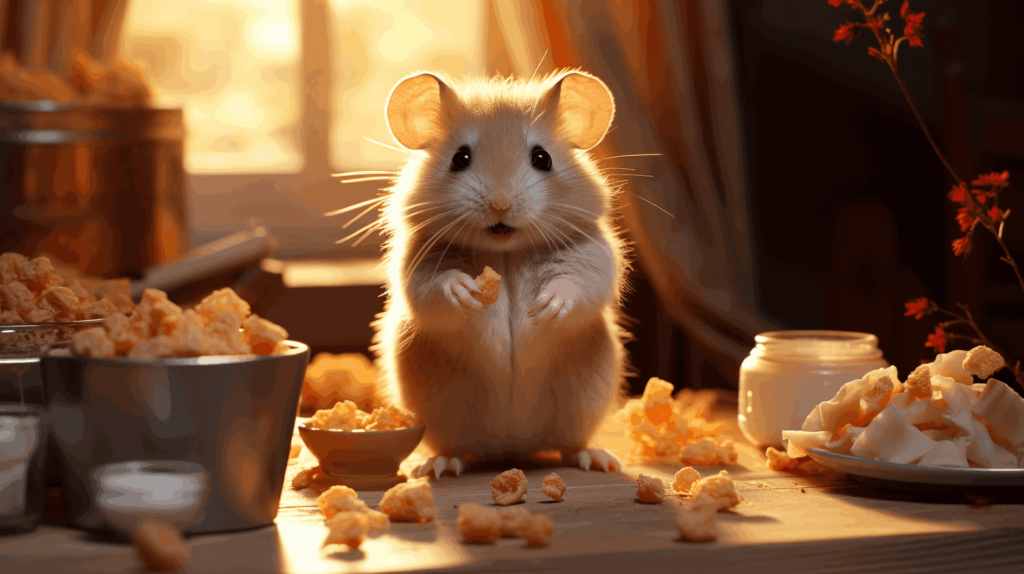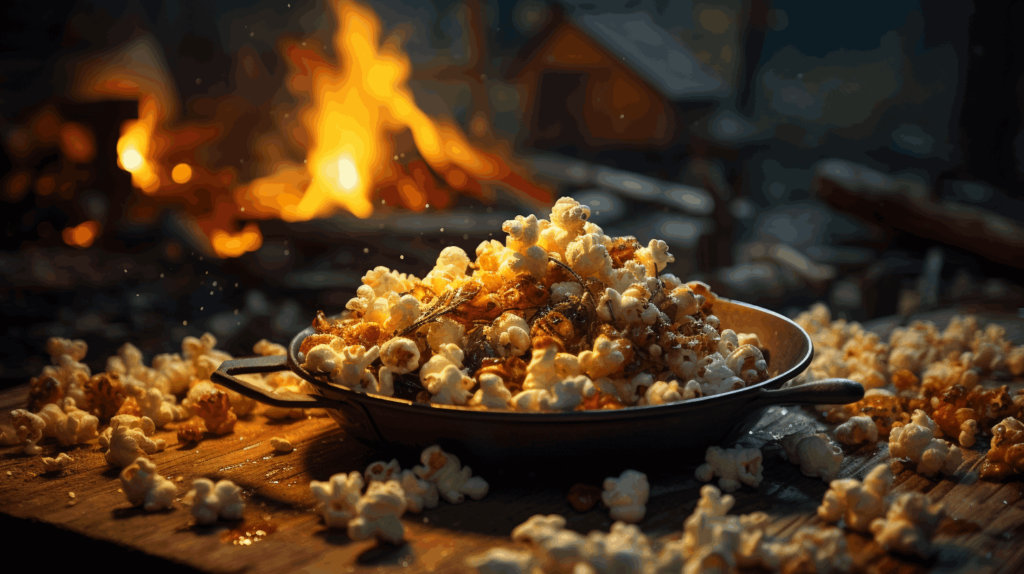In the vast wilderness, where bears roam freely, they are known for their diverse and adaptable diets. These omnivorous creatures possess the remarkable ability to consume both plant-based and animal-based sources of food.
But amidst their varied choices, a curious question arises: can bears indulge in the delectable treat of popcorn? Let us explore the intriguing relationship between bears and popcorn, delving into the nutritional value, potential dangers, and the broader scope of a bear’s diet.
Key Takeaways
- Bears can eat popcorn without experiencing any health effects.
- Popcorn is frequently used as bait for bear hunting.
- Bears are not negatively affected by popcorn flavoring ingredients.
- Bears should be approached with caution due to their unpredictable nature.
The Nutritional Value of Popcorn for Bears
The nutritional value of popcorn for bears is a topic of interest in understanding the dietary needs and potential health benefits associated with their consumption of this popular snack.
Popcorn is primarily composed of carbohydrates, providing bears with a source of energy. It also contains small amounts of protein and fiber.
Additionally, popcorn is low in fat, which aligns with the natural diet of bears that consists of a combination of plant-based and animal-based sources.
While popcorn may not offer significant nutritional value compared to other foods bears consume, its consumption can still be beneficial in terms of providing energy and satisfying hunger.
However, it is essential to note that bears should not rely solely on popcorn as their main source of nutrition, and their diet should consist of a variety of foods to meet their dietary needs.
The Role of Popcorn in a Bear’s Diet
Approximately 5% of a bear’s daily caloric intake can be attributed to the role of popcorn in their diet, providing them with a source of carbohydrates and energy. While bears are primarily omnivores, consuming a diet that consists of both plant-based and animal-based sources, popcorn serves as a supplemental food source for them.
Popcorn is a favorite treat among bears and does not have any negative side effects on their health. It is important to note that flavored popcorn does not harm bears and can even be enjoyed by humans alongside them. However, it is crucial to approach bears with caution due to their unpredictable nature, and excessive consumption of human food can lead bears to scavenge in human settlement areas, posing potential dangers to both humans and bears.
Popcorn as a Safe Snack Option for Bears
When considering the safety of popcorn as a snack option for bears, it is important to acknowledge that bears have a unique digestive system and can safely consume popcorn without any negative health effects. Popcorn is not harmful to bears because they are omnivores and have the ability to digest a variety of foods.
Although bears primarily rely on plant-based sources for their diet, they can also consume animal-based foods. However, it is crucial to note that bears may scavenge for popcorn in human settlement areas, which can be dangerous for both humans and bears. Additionally, popcorn is frequently used as bait for bear hunting, further emphasizing the need for caution when interacting with bears.
While bears can enjoy eating popcorn, it is essential to limit their exposure to excessive human food consumption to avoid negative consequences.
Potential Dangers of Bears Consuming Popcorn
Several studies have shown that a significant amount of popcorn consumption by bears can lead to digestive issues and pose potential dangers to their health.
While bears are known to enjoy eating popcorn, it is important to consider the potential risks associated with this activity.
Popcorn is a high-fiber food that can be difficult for bears to digest, especially if consumed in large quantities. This can lead to gastrointestinal problems such as bloating, constipation, and even intestinal blockages.
Additionally, the salt and butter commonly found in popcorn can be harmful to bears, as their bodies are not adapted to process these ingredients.
Furthermore, bears that become accustomed to consuming popcorn may develop a dependence on human food, leading them to scavenge in human settlement areas and increasing the risk of dangerous encounters with humans.
Therefore, it is advisable to limit popcorn consumption by bears and focus on providing them with a natural and balanced diet that meets their nutritional needs.
Popcorn as a Bait for Bear Hunting: Pros and Cons
The utilization of popcorn as bait for bear hunting raises ethical concerns and poses potential risks to both the targeted bears and the hunters involved. While popcorn may be an effective lure for attracting bears, it is important to consider the consequences of using this method.
Firstly, using food as bait can habituate bears to associate humans with a source of food, leading to increased human-bear conflicts. Bears may become more aggressive and reliant on human food, which can be harmful to both bears and humans alike.
Additionally, using popcorn as bait may not provide a quick and humane death for the targeted bears, as it may not be a sufficiently lethal method. Therefore, alternative and more ethical baiting methods should be explored to ensure the safety and well-being of both bears and hunters involved in bear hunting activities.
Exploring the Omnivorous Nature of Bears
Bears frequently exhibit their omnivorous nature by consuming a diverse range of plant-based and animal-based foods in their diet. At least 75% of a wild bear’s diet consists of plants, with berries being a favorite choice. Bears also consume leaves, grass, nuts, and certain types of grass and sedges.
However, they are not solely herbivorous, as they occasionally hunt prey such as ants, worms, fish, and the young of other animals. This balanced diet ensures that bears obtain the necessary nutrients for their overall health and well-being.
While bears can eat popcorn without experiencing any health effects, it is important to note that excessive consumption of human food can lead bears to scavenge in human settlement areas, which poses a danger to both bears and humans. Therefore, caution should always be exercised when interacting with bears.
Bears’ Favorite Plant-Based Foods: Beyond Popcorn
A variety of nutritious plant-based foods, including berries, leaves, grass, and nuts, are favored by bears in addition to popcorn. Bears have a diverse diet that consists of both plant-based and animal-based sources. At least 75% of a wild bear’s diet is comprised of plants.
Berries are a favorite plant-based food for bears and contain beneficial compounds such as the antioxidant B-17, which boosts immunity and destroys mutated cells. Bears also rely on leaves, grass, nuts, and certain types of grass and sedges for nutrition and energy.
While bears occasionally hunt prey such as ants, worms, fish, and the young of other animals, their diet primarily consists of plant-based foods. This highlights the importance of a balanced and varied diet for bears to maintain their overall health.
Understanding the Importance of Berries in a Bear’s Diet
Berries play a vital role in a bear’s diet by providing essential nutrients and contributing to their overall health. Bears rely on berries as a significant part of their plant-based diet, consuming thousands of berries in a single year.
Berries are not only a source of nutrition for bears but also contain beneficial compounds, such as the antioxidant B-17, which boosts immunity and destroys mutated cells. These antioxidants help bears maintain their overall health and well-being.
Additionally, berries provide bears with the necessary energy to survive and thrive in their natural habitat. It is crucial to understand the importance of berries in a bear’s diet and ensure their availability in order to support the health and conservation of bear populations.
Conclusion
In conclusion, while bears can safely consume popcorn without adverse health effects, it is important to consider the potential dangers associated with bears scavenging for it in human settlement areas.
Additionally, the use of popcorn as bait for bear hunting poses risks to their well-being. Bears should not be exposed to excessive consumption of human food, as this can lead to unhealthy eating habits and increase the likelihood of them searching for food in human settlements.
Therefore, it is crucial to prioritize the preservation of their natural diet and habitat.


